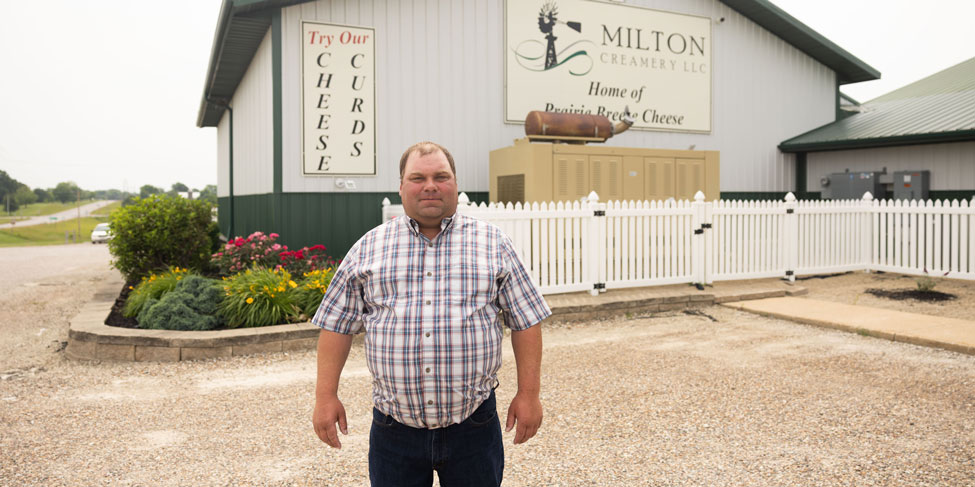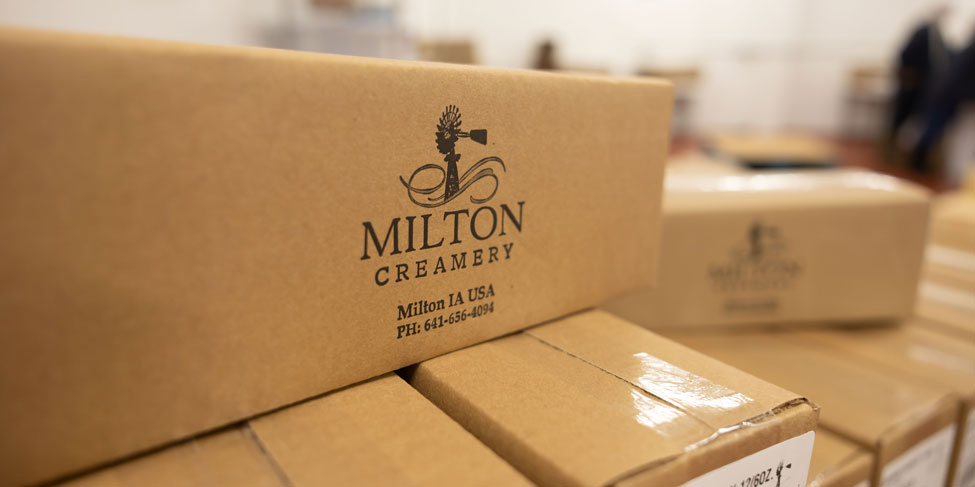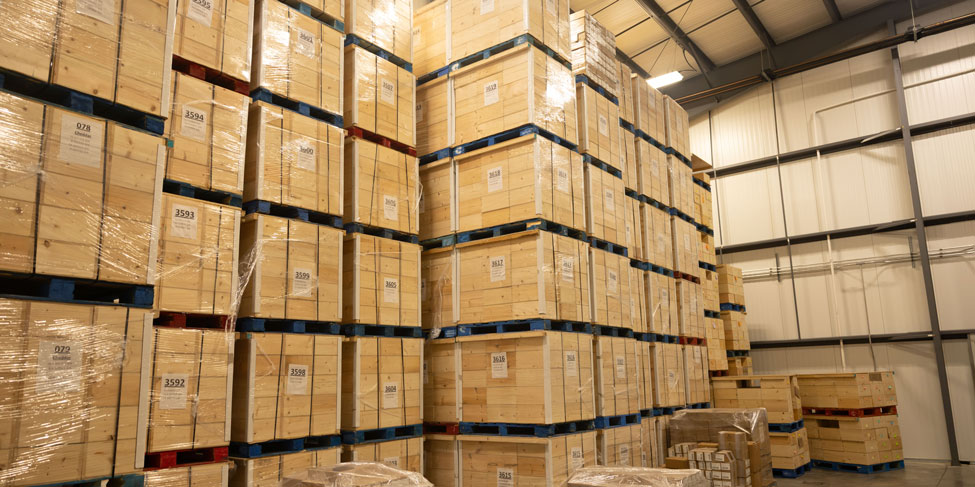A Tradition of Taste
June 16, 2025
By Gretchen Westdal Centers
After moving his family from rural Pennsylvania to Milton, Iowa, Rufus Musser told his wife Jane, known to everyone as Ms. Jane, that he would milk cows until he found something better to do. It was the early 90s, and farms and the ag economy were slowly recovering in the wake of the Farm Crisis. Musser, whose family traces their roots back to farming in Switzerland in the late 1600s, wanted to start a dairy farm operation. They are Mennonites and have a deep connection to the land, its creatures and its potential bounty. Musser knew there would be an opportunity if he navigated the balance between tradition and innovation.
That “something better” he promised Ms. Jane would evolve into the award-winning cheesemaking operation now known as Milton Creamery.
Today, cows are still being milked, not by Musser, but by the Amish and Mennonite farmers who are all within 25 miles of the creamery. Musser sources milk from these local, small-scale farmers for the nearly dozen varieties of cheese they sell, valuing the farmers’ proximity and dedication to quality. It’s a big endeavor carried out by the family, their employees and the community around them.
Milton is a town of less than 400 people and one of the 11 Villages of Van Buren — a quaint collection of enclaves in the southeast corner of Iowa that celebrate a slower way of life. The region is the perfect backdrop for running the Creamery, as it upholds tried-and-true methods while simultaneously embracing originality in the name of principle.
 In The Cheese Business
In The Cheese Business
Milton Creamery products are available in all 50 states. To produce at that level takes unwavering dedication and a commitment to excellence. Something Musser learned in his early days of farming and takes into the business. He understands that this is no small feat.
"Some of us Mussers tend to be people who march to the beat of a different drum,” says Rufus as he explains the intricacies of the entire operation. “It's 24/7. You know, you've got to be on a farm. You’ve got to be there seven days a week.”
Having a dairy farming background allows Musser to understand the network that exists between his creamery and the dairy farmers he works with.
“Cheesemaking takes dedication,” explains Rufus. “The milk keeps coming in. The cows give the milk, and you have to keep running the milk through the plant — it’s an ecosystem.”
And it’s a big ecosystem. In one run, the creamery takes a simple vat of milk and, six hours later, has 900 pounds of cheese.
Milton Creamery distinguishes itself in the specialty cheese market by embracing the natural differences inherent in milk due to the seasonality of the cows’ grazing patterns. Unlike other producers who standardize their milk, Milton Creamery responds to the milk it receives, allowing for subtle seasonal shifts in flavor as cows transition from grass to barn feed. This "eb and flow" is not a flaw but a cherished characteristic, embraced by the discerning palates of their specialty market customers.
It's paid off. The awards are plentiful. Prairie Breeze, an aged cheddar variety, is a six-time award winner that holds both national and international accolades. Additionally, the Old Style Cheddar has also taken home national and international awards. The awards and acclaim help garner more customers and more restaurant buyers and distributors.
“It is critical to have a good relationship and to be trustworthy,” Rufus explains. “We want to keep the market open, and when people see our name on the menu for a cheese board, they start to reach out. We work with probably 28 distributors across the nation as well as mom-and-pop type places.”
That versatility has allowed Milton to have a real presence in retail spaces and restaurants, everywhere from larger, chain grocery stores to smaller, local eateries and breweries.
 Nurturing Relationships and Navigating a Changing Agricultural Landscape
Nurturing Relationships and Navigating a Changing Agricultural Landscape
Building trust has been paramount for Milton Creamery, not only with its buyers but particularly in its relationships with local farmers. In the early days, being a new operation presented a risk to farmers who needed a consistent buyer. However, the agricultural landscape has seen significant changes.
Musser noted the noticeable decline in the number of small family farms, particularly in southeast Iowa. That’s driven by other agricultural pursuits, like raising cattle, that have become more financially appealing for some. This creates a challenge to maintain the density of local dairy suppliers needed to produce the Creamery’s dairy needs.
Despite these shifts, Milton Creamery strives to stay committed to the farms that produce the milk for their cheese. They rely on their hardworking farming partners, and in turn, those farmers rely on the Creamery. The strong cultural ties and the reliance on the quality milk that these local dairy farmers produce ensure that those who remain in operation will have the Creamery’s business.
 Strategic Growth and Unexpected Opportunities
Strategic Growth and Unexpected Opportunities
Milton Creamery's market growth has been a journey of strategic development, punctuated at times by fortunate accidents. The COVID-19 pandemic, while challenging, also presented an unexpected opportunity. As restaurants closed, food service sales plummeted. However, the disruption of air travel, which carried delicate French cheeses into the U.S., created a void on supermarket shelves. A major national grocer, seeking to fill these "blank spots," reached out to Milton Creamery, leading to a significant order of their popular Prairie Breeze.
"You never know, when bad things happen, there can be good things coming out of it," Rufus muses, reflecting on this pivotal moment. This experience solidified their belief that despite economic shifts, dedication and quality can create unforeseen avenues for growth.
 Looking Ahead: Innovation, Values and Legacy
Looking Ahead: Innovation, Values and Legacy
Looking to the future, Milton Creamery is focused on solidifying its current success while subtly pursuing new ventures. Musser emphasizes a fiscally conservative approach during good times: "When you have good times, instead of buying the new pickup, you pay off the old one," he says. Challenges remain, particularly in securing sufficient labor for cutting and labeling, which has led to plans for automation in the coming years.
However, the long-term vision includes innovation. With delight, Musser reveals a dream of introducing new soft products, specifically Quark, over the next five years. Drawing on old Swiss-German family recipes, he believes there's an untapped opportunity in the American market for high-protein, higher-fat dairy products. However, he acknowledges the "fickle" nature of the food market.
Beyond new products, the core philosophy of Milton Creamery is deeply rooted in community and shared prosperity. "Remember that you're just a little guy," he advises, advocating for a "for us, for we" mindset.
He eloquently describes a system where "The sun shines on grass, grass grows and cows eat grass. Everybody's got to be taken care of from the consumer to the grass... Everybody's got to have their nickel."
Milton Creamery's story is one of a family business that, through unwavering dedication, innovative thinking and a deeply ingrained sense of community and shared prosperity, has found its sweet spot. Not just in the heartland, but across the nation.